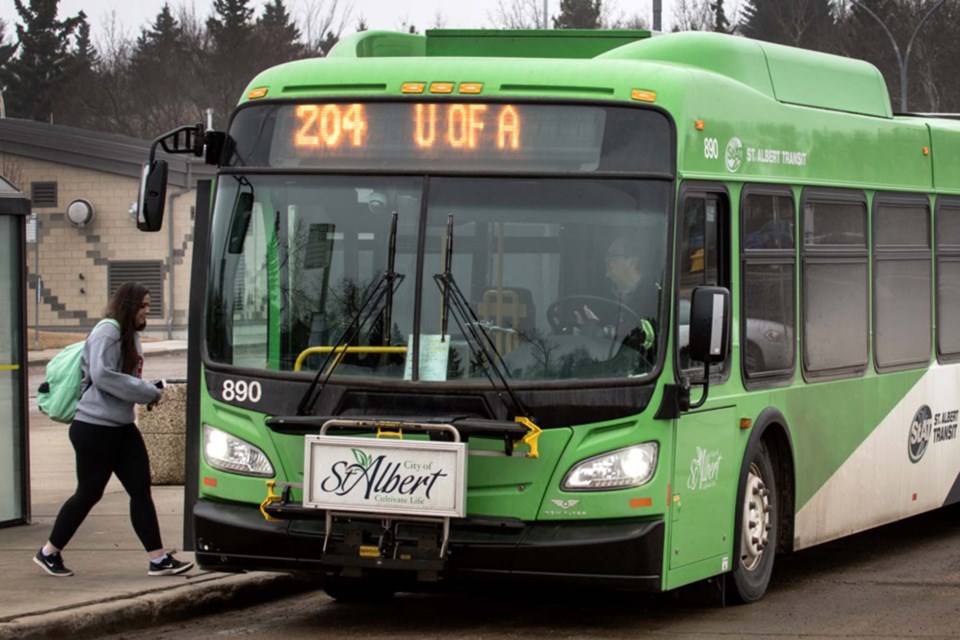Regional transit service is moving forward, though the ultimate costs St. Albert could shoulder in the first phase of delivery are still to be decided.
The Edmonton Metropolitan Transit Services Commission (EMTSC) released its service plan earlier this month outlining 11 routes throughout the Edmonton region that will make up the first phase of regional transit services. Service is scheduled to begin by spring or summer 2023.
How much St. Albert would pay for the service will be decided in October, when the commission approves its budget.
Lucas Warren, communications manager for the commission, said in an email Tuesday the commission has an estimate of Edmonton’s cost — some $7.2 million — because “their situation involves completely new transit service routes.”
“In the case of St. Albert, as the transit service is being transferred to the commission, more work is required to determine new costs versus the current transit service budget for St. Albert,” Warren said in the email.
Service plan
The service plan includes four lines that connect with St. Albert: Metro Northwest 1, which runs from St. Albert Exchange, down St. Albert Trail to Government Centre in Edmonton; Metro Northwest 2, a direct route from St. Albert to NAIT; Metro Northwest 3, which runs from St. Albert Exchange along St. Albert Trail and Groat Road to the University of Alberta; and Metro Cross, which connects Nakî Transit Centre to the West Edmonton Mall, later running to Edmonton’s Clareview Transit Centre.
According to the cost-sharing agreement approved Thursday, St. Albert will pay 90 per cent of the costs for the first three lines, and 45 per cent of the Metro Cross Route.
While the service routes for St. Albert will largely mirror those already in place, Coun. Wes Brodhead, commission chair and St. Albert city councillor, said what will be achieved with this plan is “true regionalization.”
“It’s about the region working together to meet the needs of our community,” Brodhead said, adding that subsequent phases of service delivery will focus on specialized transit and other levels of service, expanding the ability for transit, such as Handibus Service from St. Albert to Edmonton.
Edmonton city council voted 10-3 on Sept. 7 to support the first phase of the network, but will ultimately decide whether to chip in its estimated share of phase one costs — some $7.2 million — during budget deliberations later this year.
Outstanding concerns
When the option to put the $7.2 million for the commission on the table at budget discussions came before Edmonton city council, some council members expressed concerns about how much the city would have to chip in for later phases.
St. Albert has already backed a $2.37-million loan to the transit commission for a $7-million line of credit for the commission to get services up and running. Edmonton guaranteed the remainder.
Darlene Malayko, an elected representative for St. Albert drivers from the Amalgamated Transit Union – Local #569, said beyond representing workers, she is concerned about the service plan as a St. Albert citizen.
“I feel that this is a bad plan for all involved,” Malayko said.
The St. Albert transit lines included in the service plan are “bread-and-butter routes,” she said, as they already have consistent ridership of university students, and a reliable source of funding through university tuition.
While Malayko supports the ideas behind regional transit, she said the Edmonton metropolitan region currently doesn’t have the population to support the service, and that St. Albert would be better served focusing on improving local service delivery.
“We need to fund our system well in St. Albert,” Malayko said, noting St. Albert city council voted last budget season to switch all Saturday service to on-demand to save $223,000 each year.
Malayko said there is already regional collaboration when it comes to transit, and municipalities who have pulled out of the commission will be able to maintain regional connections without shouldering additional costs.
Sturgeon County and Morinville have also pulled out of the commission since it was first discussed in 2019, in addition to the counties of Strathcona, Leduc, and Parkland.
Municipalities still belonging to the commission in addition to St. Albert and Edmonton are the cities of Fort Saskatchewan, Spruce Grove, and Leduc, as well as the towns of Beaumont, Stony Plain, and Devon.
Without the 13 original municipal partners, the plan is too unstable, she said.
“All those partners had to be in for this plan to work, but they’re not in,” Malayko said.
Asked about whether the current plan remains the right one to bring regional transit forward, Brodhead said municipal partners who left the commission “didn’t turn their back on the concept,” but rather felt it wasn’t the right time.
Despite changes, Brodhead said the current service plan still caters to the needs of all municipalities that remain a part of the commission.
“This isn’t some outside body coming in and imposing their will on any municipality,” Brodhead said. “This is [us] working together to come up with a service plan that reflects the needs of the region.”
Brodhead said laying the groundwork for regional transit now will be essential as the region grows, and as St. Albert’s Lakeview Business District is serviced and developed.
“What we’ve found is for site locators who hope to bring significant investment into the region [is] public transit and the ability to travel within and throughout the region is key to them,” Brodhead said.
“If we don’t have it, the region doesn’t make the shortlist.”




